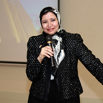- Published:
- 18 January 2024
- Author:
- Professor Mona El-Bahrawy
- Read time:
- 2 Mins
Professor Naveena Singh, a renowned gynaecological histopathologist with a special interest in gynaecological cancer, sadly died on Thursday 5 October 2023. In the last year of her life, she continued to be active, maintaining her cheerful demeanour and passion for her life and work while battling a serious health challenge.
Professor Singh studied medicine in India and graduated from the University of Delhi in 1989, after which she trained in pathology in India and in the UK. She became a member of the Royal College of Pathologists in 1998, then a Fellow in 2008. For many years, she worked at St Bartholomew’s and the Royal London Hospitals in London. She was a consultant pathologist at Barts Health NHS Trust, becoming an honorary professor at Barts and the London School of Medicine and Dentistry, Queen Mary University of London. In 2021, she took up the posts of clinical professor at the University of British Columbia (UBC) and anatomic pathologist at Vancouver General Hospital, Canada.
Throughout her career, Naveena was a valued member of several professional societies. She served as the Meetings Secretary (2007–2012) and President (2016–2019) of the British Association of Gynaecological Pathologists (BAGP). She was a leading member of the Education Committee of the International Society of Gynecological Pathologists. She was also an active member of expert committees, including the European Society of Medical Oncology and the International Collaboration in Cancer Reporting.
Naveena was a great trainer and teacher, who contributed to numerous teaching activities and scientific meetings and facilitated the development of educational material on a range of topics. She led national and international collaborative studies and contributed to many research trials and quality improvement projects, focusing on improving accuracy and precision in gynaecological histopathology reporting.
Her work helped to refine the reporting of different gynaecological cancers and was incorporated into guidelines, book chapters and scientific articles. She established criteria for assignment of primary site and assessing response to chemotherapy in tubo-ovarian serous carcinoma. She led and co-authored multiple chapters in the World Health Organization Classification of Female Genital Tumours.
In recent years, she devoted her attention to the implementation of molecular classification of endometrial carcinoma into routine diagnostic practice. In 2021–2022, she led a successful application to make POLE testing accessible to all endometrial cancer patients in England, alongside a testing algorithm endorsed by the British Gynaecological Cancer Society. She moved to Canada to work on joint projects between UBC and multiple NHS centres in the UK on the impact of tumour genetics in the management of uterine cancers.
I worked closely with Naveena for many years; together we served as council members and officers of the BAGP. She balanced her different professional commitments without losing sight of her personal life and her family. Her professional achievements, her simplicity and her consistently maintained calm and shy smile, even in the most challenging situations, will continue to be remembered and to inspire.

